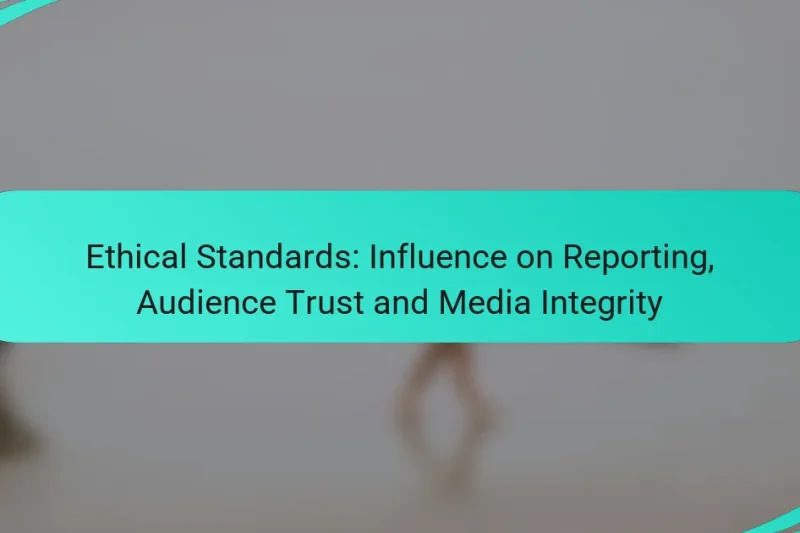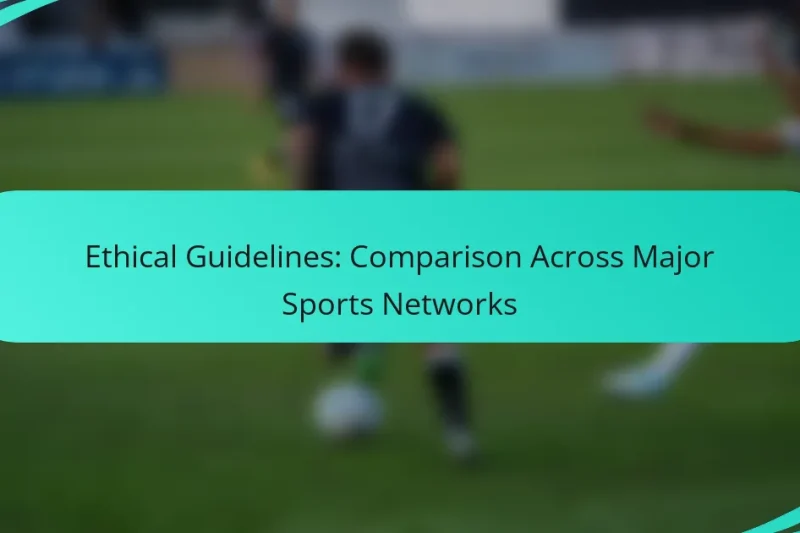Sports reporting frequently encounters ethical dilemmas that challenge journalistic integrity and athlete welfare. Issues such as … Ethical Dilemmas: Case Studies in Sports ReportingRead more
Ethics in Sports Journalism
Ethics in sports journalism is essential for maintaining the integrity and credibility of reporting in a field often influenced by various pressures and biases. Journalists face numerous challenges, including conflicts of interest and the need for accuracy, which can affect their ability to report fairly. By adhering to established ethical standards and fostering transparency, sports journalists can build trust with their audiences and uphold the profession’s integrity.
Evaluating Ethical Practices: Standards for Sports Journalists
Evaluating ethical practices in sports journalism is crucial for maintaining the integrity and credibility of the … Evaluating Ethical Practices: Standards for Sports JournalistsRead more
Ethics: Covering Sensitive Issues in Sports Media
Covering sensitive issues in sports media requires a commitment to ethical principles such as accuracy, empathy, … Ethics: Covering Sensitive Issues in Sports MediaRead more
Ethical Journalism: Impact on Audience Trust and Media Credibility
Ethical journalism plays a crucial role in building audience trust and enhancing media credibility by prioritizing … Ethical Journalism: Impact on Audience Trust and Media CredibilityRead more
Conflicts of Interest: Navigation Strategies in Sports Journalism
Conflicts of interest in sports journalism pose significant challenges to maintaining integrity and unbiased reporting. Effective … Conflicts of Interest: Navigation Strategies in Sports JournalismRead more
Ethical Standards: Influence on Reporting, Audience Trust and Media Integrity
Ethical standards are essential in media reporting as they ensure the accuracy and responsibility of the … Ethical Standards: Influence on Reporting, Audience Trust and Media IntegrityRead more
Ethical Guidelines: Comparison Across Major Sports Networks
In the realm of sports journalism, major networks like ESPN, NBC Sports, and CBS Sports uphold … Ethical Guidelines: Comparison Across Major Sports NetworksRead more
What are the ethical challenges in sports journalism?
Sports journalism faces several ethical challenges that can impact the integrity of reporting. Key issues include conflicts of interest, bias in reporting, privacy concerns, misrepresentation of facts, and pressure from stakeholders.
Conflict of interest
Conflicts of interest arise when a journalist’s personal interests interfere with their professional responsibilities. For instance, a reporter covering a team may have financial ties to that team, which can compromise their objectivity.
To mitigate conflicts, journalists should disclose any relationships that could influence their reporting. Transparency helps maintain credibility and trust with the audience.
Bias in reporting
Bias in reporting occurs when journalists allow personal opinions or affiliations to color their coverage. This can manifest as favoritism towards specific teams or players, leading to skewed narratives.
To ensure balanced reporting, journalists should strive for impartiality by presenting multiple perspectives and avoiding sensationalism. Fact-checking and sourcing diverse viewpoints are essential practices.
Privacy concerns
Privacy concerns in sports journalism involve respecting the personal lives of athletes and their families. Intrusive reporting can lead to ethical dilemmas, especially when covering sensitive topics.
Journalists should weigh the public’s right to know against an individual’s right to privacy. Obtaining consent before sharing personal information is a best practice to avoid ethical breaches.
Misrepresentation of facts
Misrepresentation of facts can occur when journalists present information inaccurately or out of context. This can damage reputations and mislead the audience.
To combat misrepresentation, journalists must verify facts through reliable sources and provide context. Employing rigorous editorial standards can help uphold accuracy in reporting.
Pressure from stakeholders
Pressure from stakeholders, such as teams, sponsors, or fans, can influence how stories are reported. Journalists may face challenges in maintaining independence while catering to these pressures.
To navigate this, journalists should adhere to ethical guidelines and prioritize journalistic integrity over external pressures. Establishing a clear separation between reporting and promotional content is crucial.
How can sports journalists maintain integrity?
Sports journalists can maintain integrity by adhering to ethical standards, ensuring accuracy in reporting, and being transparent with their sources. These practices help build trust with audiences and uphold the credibility of the profession.
Adhering to ethical codes
Adhering to ethical codes is fundamental for sports journalists. Organizations such as the Society of Professional Journalists (SPJ) provide guidelines that emphasize honesty, fairness, and accountability. Following these codes helps journalists navigate complex situations and make ethical decisions.
For example, journalists should avoid conflicts of interest, such as covering events where they have personal stakes. They should also refrain from accepting gifts or favors that could compromise their objectivity.
Fact-checking and verification
Fact-checking and verification are crucial steps in maintaining journalistic integrity. Journalists should verify information from multiple reliable sources before publishing. This process helps prevent the spread of misinformation and enhances the credibility of their reports.
Utilizing tools like databases, official records, and reputable news outlets can aid in this verification process. Journalists should aim to cross-check facts, especially when reporting on sensitive issues or breaking news.
Transparency with sources
Transparency with sources fosters trust between journalists and their audience. Journalists should clearly attribute information and disclose their sources whenever possible. This practice not only enhances credibility but also allows readers to assess the reliability of the information presented.
For instance, if a journalist relies on anonymous sources, they should explain the rationale behind this choice and the context of the information provided. This approach helps maintain transparency while protecting sources when necessary.
What role do organizations play in promoting ethics?
Organizations play a crucial role in promoting ethics in sports journalism by establishing standards and fostering a culture of integrity. They provide frameworks that guide journalists in making ethical decisions and maintaining public trust.
Establishing ethical guidelines
Establishing ethical guidelines involves creating a clear set of principles that journalists must follow. These guidelines often cover issues such as accuracy, fairness, and respect for privacy, which are essential for maintaining credibility in reporting.
Organizations can adopt established codes of ethics, such as those from the Society of Professional Journalists or the International Sports Press Association, to ensure their journalists adhere to recognized standards. Regular updates to these guidelines can help address emerging ethical challenges in the rapidly evolving sports landscape.
Providing training and resources
Providing training and resources is vital for equipping journalists with the skills needed to navigate ethical dilemmas. Workshops, seminars, and online courses can enhance their understanding of ethical practices and decision-making processes.
Organizations should also offer access to resources such as case studies, ethical decision-making frameworks, and expert consultations. This support can empower journalists to address ethical issues confidently and effectively.
Enforcing accountability measures
Enforcing accountability measures ensures that journalists adhere to ethical standards and are held responsible for their actions. This can include regular performance reviews, ethical audits, and mechanisms for reporting unethical behavior.
Organizations should establish clear consequences for ethical violations, which may range from reprimands to termination, depending on the severity of the infraction. Creating a transparent process for addressing complaints can also foster a culture of accountability and trust within the organization.
How does audience perception influence sports journalism ethics?
Audience perception significantly shapes the ethics of sports journalism by dictating what stories are covered and how they are presented. Journalists often feel pressured to align their reporting with audience expectations, which can lead to ethical dilemmas regarding accuracy and sensationalism.
Impact of social media
Social media has transformed how sports journalism operates, creating a direct line between journalists and their audience. This immediacy can lead to a rush for breaking news, sometimes at the expense of thorough fact-checking and ethical standards.
Journalists must navigate the fine line between engaging their audience and maintaining integrity. The viral nature of social media can amplify misinformation, making it crucial for reporters to verify facts before sharing them.
Demand for sensationalism
The demand for sensationalism in sports journalism often arises from audience preferences for dramatic narratives over straightforward reporting. This can lead to exaggerated claims or biased coverage that prioritizes entertainment over factual accuracy.
To counteract this trend, journalists should focus on delivering balanced stories that provide context and depth. Avoiding clickbait headlines and prioritizing substance can help maintain ethical standards while still engaging readers.
Trust in media sources
Trust in media sources is essential for the credibility of sports journalism. When audiences perceive a lack of integrity or sensationalism, they may turn away from certain outlets, impacting their reach and influence.
Building and maintaining trust requires transparency in reporting practices and a commitment to ethical standards. Journalists should be clear about their sources and methodologies, fostering an environment where audiences feel confident in the information presented.
What are the best practices for ethical reporting?
Best practices for ethical reporting in sports journalism include accuracy, fairness, and accountability. Journalists should strive to present facts objectively while respecting the dignity of all individuals involved in the sports community.
Ensuring balanced coverage
Balanced coverage means providing equal representation to all sides of a story. This involves not only reporting on the winning team but also giving voice to the losing side, ensuring that all perspectives are heard and understood.
To achieve balanced coverage, journalists should verify facts from multiple sources and avoid biases that may favor one team or player over another. For example, when covering a controversial match, include quotes from both coaches and players to present a comprehensive view.
Engaging with diverse perspectives
Engaging with diverse perspectives enriches sports journalism by incorporating voices from various backgrounds. This can include insights from athletes of different genders, ethnicities, and socioeconomic statuses, which helps to create a more inclusive narrative.
Journalists should actively seek out interviews and opinions from underrepresented groups within the sports community. For instance, featuring stories of female athletes or athletes from minority backgrounds can highlight their contributions and challenges, fostering a deeper understanding among audiences.






